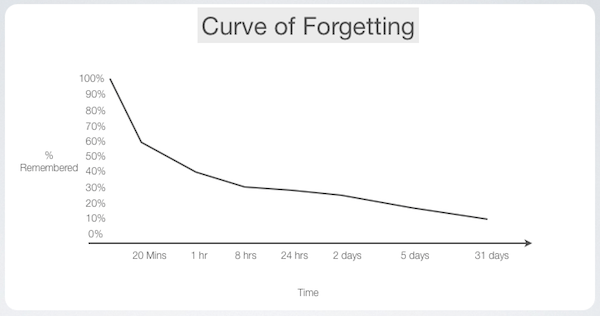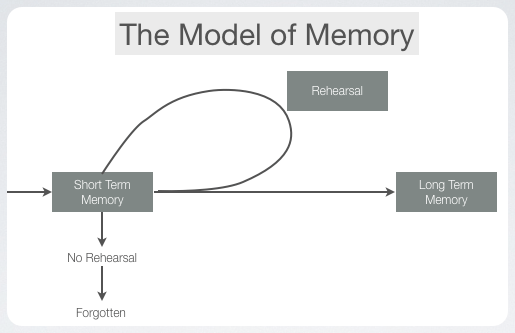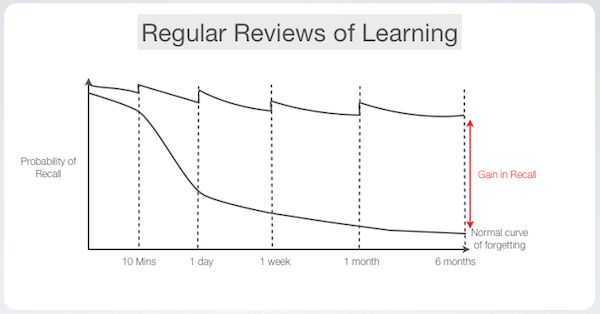According to the UK Commission for Employment and Skills, businesses and organisations in the UK are spending nearly £50 billion annually on training, this seems like a huge total to me, and since training is supposed to be an investment in your future, it begs the question of how much is this training actually adding in value to you as an individual and to our organisations?
The answer is more than likely to be, not as much as you think and not as much as it could be. I think that you probably realise this as being true, that may be why you are reading this article. It is not that the current trainers are any worse than in the past, it hasn’t got anything to do with the material that is being trained, it is not specific to where in the world that you live, it is to do with forgetting!
Would you pay for and take a training if you knew at outset that in one months time you would only be able to recall a tenth of what you learn on the training course? This is the sad reality of most training courses, have a look at the Ebbinghaus Curve of Forgetting in the diagram below.

Time is our most precious resource and it seems like a great idea to dedicate a day or a week to intensive training. It gets us out of the office or out of the house, to an environment where there are fewer distractions, where we can concentrate only on training and at the end of the course we will have a brand new set of skills. This is the way that it works, right? Yes, this is the way that it works. The problem is what happens next….
We return from the training and there are a pile of tasks waiting for us to catch up on. All of a sudden we are thrust back into a hectic world of working to other people’s priorities. Everything is urgent since it needed doing yesterday, when we were training. You get the picture.
Before we know it a week has gone by and we haven’t yet had time to review the things that we learnt on our training course. In fact we haven’t had time to practice any of the new skills yet either since we have been so busy and we don’t want to try new skills until we have time to make sure that we get them right.
Another week goes by and we still haven’t had a chance to revisit our training notes. Before we know it a month has passed and if we were to think about the training now, how much of it would we remember? About 10%, the rest is forgotten.

They say that repetition is the mother of learning. All habits are created through repetition and rehearsal. The only way to benefit from new skills training is to leave the training and use the new skills straight away. This is simple when the training involves using a new piece of machinery or equipment. We are forced to review our training and practice our new skills in order to do our job and to function properly. It is not so straight forward when it comes to soft skills, people skills, communication skills, leadership and management skills for example.
The tendency when we are rushed, when we are busy, when we are under pressure is to use the skills that we are familiar with. So, when we come back from our training, we tend to revert to our familiar old skills as we cope with the demands of catching up on the time that we have missed. Unless we go back to the training or use the new skill immediately, then much of what we have learnt will leave us forever and we will not get a chance to integrate it into our lives.
Here is what can happen if we are able to review our training on a regular basis:

The gain in recall by process of repetition is remarkable. This is how to get real value from your training.
Now with this in mind, imagine the benefits of taking a training online.
We are talking here about using the full resources of modern technology, of multimedia training resources, we are talking about taking advantage of modern flexible working practices and the fact that more and more people work from home.
Online training resources such as ours are available 24/7, so you choose a time and a place to train that suits you.
Here are 7 ways to realise the benefits of online training and get great value for money from your training:
Tip 1 – Set up regular meetings with yourself, training meetings. I recommend training in blocks of one to two hours, taking regular breaks and reviewing the material that you are learning every ten or fifteen minutes. The benefits of this are that you start a cycle of repetition to aid your recall. In addition, one hour away from your normal hectic schedule is not going to leave you with a whole list of urgent tasks to catch up on.
Tip 2 – You are learning in bite sized chunks and you can start to integrate what you have learnt straight away. Make a commitment to yourself at the end of your training meeting to implement a part of the training immediately.
Tip 3 – At the start of your next training meeting review what you learnt last time. Repetition aids recall.
TIp 4 – Online training such as ours normally comes in modules. At the end of each module take time to reflect on what you have learnt, write down your reflections. Again this will act as a review of your training and aid recall.
Tip 5 – Go through each module of training at least three times. Watch the videos, listen to the audio, read the manual at least three times in your initial training. During one of these times make copious notes, pausing the videos/audio when you need to and rewinding if necessary.
Tip 6 – Do the exercises as you go through the training material. Remember, habits are created by taking repetitive actions. Pause your training and take action to do the exercises in your training straight away.
Tip 7 – Once you have finished your course and gained your qualification, the tendency is to think that you know the material and it will be with you forever. This is true of the skills that you use regularly and at the same time we all develop bad habits. If possible make an arrangement with your training supplier to retain access to your course material so that you can make on-demand reviews of specific sections of the course and schedule a six monthly training reviews.
